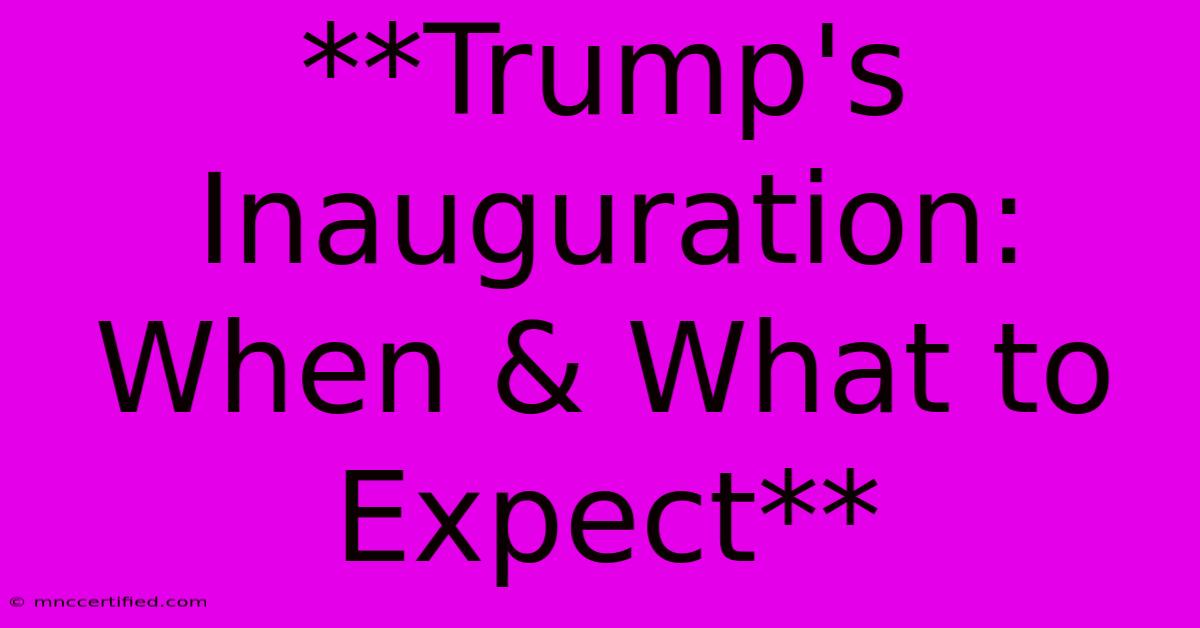**Trump's Inauguration: When & What To Expect**

Table of Contents
Trump's Inauguration: When & What to Expect
Donald Trump's inauguration as the 45th President of the United States was a historic event that drew global attention. It was a day filled with symbolism, speeches, and pageantry, marking the start of Trump's four-year term. While his presidency has been marked by controversy, the inauguration itself remains a significant moment in American history.
When Did the Inauguration Take Place?
The inauguration took place on Friday, January 20, 2017, at noon EST. This date is significant because it adheres to the 20th Amendment of the US Constitution, which stipulates that the president's term begins at noon on January 20th following the presidential election.
The Ceremony: A Detailed Look
The inauguration ceremony was held at the West Front of the US Capitol Building in Washington, D.C., a traditional venue for presidential inaugurations. The event featured several key components:
- The Oath of Office: Chief Justice John Roberts administered the oath of office to Trump, officially swearing him in as the President of the United States.
- Inaugural Address: Trump delivered his inaugural address, outlining his vision for the country and setting the tone for his presidency. The speech was known for its strong rhetoric and promises of change.
- Musical Performances: The event featured performances by a diverse range of artists, including the Mormon Tabernacle Choir, Jackie Evancho, and Lee Greenwood.
- The Inaugural Parade: Following the ceremony, a parade proceeded down Pennsylvania Avenue, showcasing military units, marching bands, and floats.
Key Moments & Controversies
Trump's inauguration was not without its controversies:
- Protests: Large-scale protests took place in Washington, D.C., and across the country, with many attendees expressing their disapproval of Trump's policies and rhetoric.
- Low Attendance: The inauguration drew a considerably smaller crowd than previous inaugurations, with estimates ranging from 800,000 to 1.5 million people.
- Alternative Inauguration: Women's March on Washington, a massive protest against Trump's presidency, took place the day after the inauguration.
What to Expect from the Inauguration of a New President
While the specific details of each inauguration ceremony may differ, certain elements remain consistent:
- A formal event: The inauguration is a formal, ceremonial occasion, often filled with pageantry and tradition.
- Speeches and addresses: The new president will deliver an inaugural address outlining their vision for the country.
- Swearing-in ceremony: The new president will take the oath of office, officially marking the beginning of their term.
- Celebrations: The inauguration is often accompanied by parades, concerts, and other events.
How to Stay Informed About Future Inaugurations
Staying informed about future inaugurations is crucial for anyone interested in the political process. Here are some ways to keep up-to-date:
- Official websites: The White House website and the US government's official websites provide details about upcoming inaugurations.
- News outlets: Major news networks and online publications will cover the event extensively.
- Social media: Social media platforms offer real-time updates and coverage.
The inauguration of a new president is a defining moment in American history. It represents a transfer of power and a promise of change. Understanding the significance of the event and its potential impact on the nation is essential for informed citizenship.

Thank you for visiting our website wich cover about **Trump's Inauguration: When & What To Expect**. We hope the information provided has been useful to you. Feel free to contact us if you have any questions or need further assistance. See you next time and dont miss to bookmark.
Featured Posts
-
Profoundly Disturbed The View On Trump Win
Nov 07, 2024
-
Trumps Presidential Inauguration Timeline
Nov 07, 2024
-
Donald Trumps Inauguration Timeline
Nov 07, 2024
-
Senate Shifts Red Gop Wins Majority
Nov 07, 2024
-
1 0 Club Brugge Victorious Against Aston Villa
Nov 07, 2024